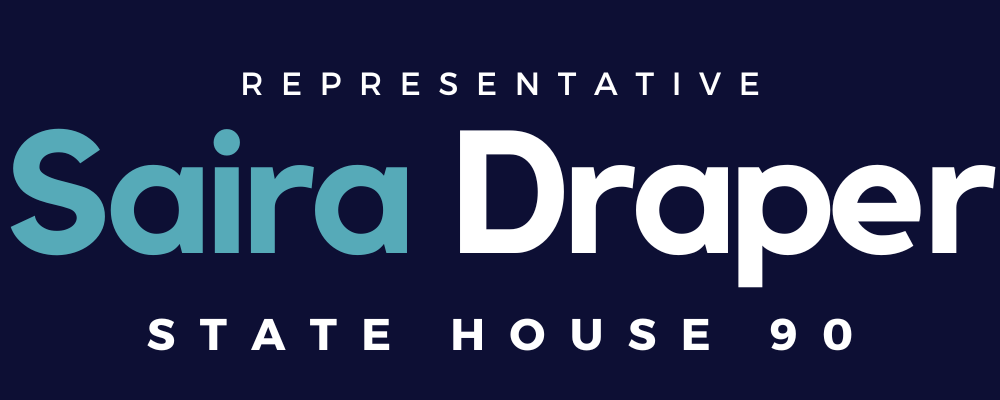Crossover Day Recap
Legislative Update
March 19, 2023
Greetings dear friends.
Phew! We have passed a critical point in the 2023 legislative session and the pace and apparent chaos only increases from here as we race toward Sine Die at the end of this month.
Crossover Day was on March 6. The significance of Crossover Day is that any bill that has a chance to become law this year must have been passed by either the House or the Senate by then. Those bills that did not pass through at least one chamber can be held over until next year.
However, there is a frequently-used tool to keep pieces of legislation alive even if they haven’t yet crossed over. The text of one bill can be attached to another piece of germane legislation that has surpassed the crossover hurdle. That means we are tracking everything closely until the gavel falls and the speaker declares the 2023 session “sine die!”
In this newsletter I want to talk to you about why I voted the way I did on some bills that passed the House over Crossover week. I’ll also go over some key items in the proposed budget that we also passed that week.
In service,
Why I voted Yes
House Bill 458 and House Bill 196 would finally get the medical marijuana industry off the ground in Georgia. These bills expand who is eligible to grow and sell hemp and increase the number of licenses issued for the production of medical marijuana from two to fifteen. While the Legislature passed a law in 2015 allowing registered patients to use low THC oil, the medical marijuana industry has been on hold in Georgia due to a court challenge from companies who were not granted state approval. But because this legislation provides more options, the hope is patients in Georgia will finally have access to the medical care they’ve been promised
House Bill 462 is known as the Raise the Age Act. Once law, teenagers 18 and below would be under the jurisdiction of the juvenile court system–rather than just those 17 and younger as is the current law. The Superior Court would retain jurisdiction over teenagers charged with serious felonies like murder and armed robbery.
17-year-olds are still children and should be treated as such. In most cases, the programs and options that juvenile courts offer ensure that these young people can return to society better equipped for their futures. Georgia will be the 48th state to pass legislation to treat 17-year-olds as juveniles in their criminal justice systems, putting Georgia in line with most other states in the nation.
House Bill 30, Protecting Against Antisemitic Crimes, allows for enhancing punishment in criminal and civil courts if there is evidence of antisemitism. This would be no different than if there was discrimination based on race, religion or national origin. HB30 also directs state agencies to consider antisemitism as evidence of discriminatory intent. There’s been an undeniable increase in anti semitic acts over the past several years, and I was pleased to vote with the majority of colleagues to signal that this is not something Georgians will tolerate.
House Bill 438 attempts to improve the reading skills of our children, a skill that is critical to success later in life. The Georgia Early Literacy Act, based on a study committee’s findings released last fall, would require schools to use high-quality literacy instructional materials
from kindergarten through third grade, provide special training for reading teachers, and implement screening so struggling students can be identified quickly and helped.
House Bill 557 would allow advanced practice registered nurses and physician assistants to prescribe an initial five-day supply of Schedule II controlled substances and ADHD medication under the supervision of a medical doctor or a psychiatrist. This change will especially help residents in rural Georgia where there are severe hospital and medical staff shortages.
Why I voted No
House Bill 101 concerns tax credits for donations to rural hospitals and for grants to private schools. It’s the section about schools that concerned me, especially considering that members of the House Ways and Means Committee only saw the text just before they were asked to vote on it. HB 101 provides additional funding for private schools by increasing the student scholarship organization tax credit to $130 million annually beginning in 2024. At the same time, HB 101 says public school grants will end in 2028.
House Bill 231 would create a board to oversee district attorneys and solicitors, giving that board the authority to remove any prosecutor it thinks has gone “rogue.” Many believe this bill specifically targets Fulton District Attorney Fani Willis, who is considering seeking criminal charges against former President Donald Trump. But there is another prosecutor supporters of the legislation supposedly have in mind– District Attorney for Athens-Clarke County, Deborah Gonzalez. Key sponsor, Rep. Houston Gaines of Athens, is a former political opponent of Gonzalez, and both he and Governor Kemp have been critical of her. HB231 passed the House despite opposition of all but one Democrat and many prosecutors from across the state. There is no need for an oversight board because there is already a group that decides if a prosecutor is doing his or her job: the voters.
House Bill 189 would allow heavier trucks on state and local roads if they are delivering agricultural products within a 250-mile radius. While this might save money for the producers of timber, chickens, or granite, it will cost taxpayers more to repair roads damaged by excessive weight, and increase hazards for vehicles they share the road with.
The proposed budget for the fiscal year that starts July 1
There’s good and there’s bad in this $32.4 billion proposed spending plan, which is 7.4 percent more than the budget in effect now.
Some of the good in this proposed budget includes:
More money for services for adults and youth with developmental disabilities and mental health issues.
More money for some low-income Medicaid recipients, including for dental services, increased reimbursement rates for speech-language pathology and various therapies and increased reimbursement rates for primary care and OB/GYN.
Continuation of free school breakfasts and lunches for low-income children.
More money for the unwinding of Medicaid (more detail below).
More money for public defenders
More money to HOPE scholarships so that they will cover 95 percent of college costs. (Unfortunately, this is 5% short of the Governor’s promise to fully fund HOPE.)
Some of the bad in this spending plan includes:
A $111.5 million reduction in Medicaid funding for the elderly, blind and disabled.
A cut in grant funds for the OneGeorgia Authority, a program that is critical to developing the economies of rural Georgia.
Money for raises and to retain staff at private prisons in Georgia. $25.7 million to open a new prison in McRae and $25.7 million to open a new prison in McRae.
A reduction in money in airport aid.
A decrease in the employer contribution to the public school teacher retirement system.
Medicaid Unwinding
We will reach a critical Medicaid funding issue next month when federal COVID healthcare dollars for low-income people expire. The House version of the proposed budget includes $7.8 million to staff the “unwinding.” On April 1, about 2 million people – 70 percent of them children and the rest pregnant women and the disabled – will no longer be covered by this temporary Medicaid expansion unless they reapply. The money in the budget is supposed to pay for staff to help them negotiate this confusing system.
I co-sponsored a bill to provide staffing and monetary resources for Medicaid unwinding. And though it never was heard in committee, it’s heartening to see this funding was included in the budget.
But what we really need to do is take advantage of the federal dollars available to fully expand Medicaid in Georgia. I co-sponsored House Bill 38, which would instantly give Medicaid healthcare coverage to those 500,000 Georgians who make too much to qualify for Medicaid but make too little to afford insurance on the government exchange. HB38 remains stalled in committee and is likely dead for this session.
Missing a Dear Friend
This month I unexpectedly lost a friend and colleague, Rep. Tish Naghise of Fayetteville. She was a member of the freshman class with me, but I also knew her from her years of involvement with the Georgia Democratic Party as a regional field director and a delegate to the Democratic National Convention in 2020.
Rep. Naghise will be dearly missed by all of us in the General Assembly, and we offer our deepest condolences to her friends and family.
With Representatives Miller, Barnes, and our dear friend and colleague, Representative Tish Naghise.
Questions? Concerns? Need Help?
There are several ways you can share your concerns, request assistance, or let me know about activities in our neighborhoods.
The best way to get in touch is through the contact us form on my website. But, you can also reach me by calling the office (404-656-0265), sending an email to saira.draper@house.ga.gov, or visiting the Capitol. My office is 604-D in the Coverdell Legislative Office Building across the street from the south side of the Capitol.
For more frequent updates, please follow me on social media (links at bottom).
HD90 Spotlight
Our people make our community great. And I want to spread the good news.
If you know a person, business, or organization in HD90 that is doing amazing things, please let me know. We'll feature them in a future installment of the Draper Paper.





